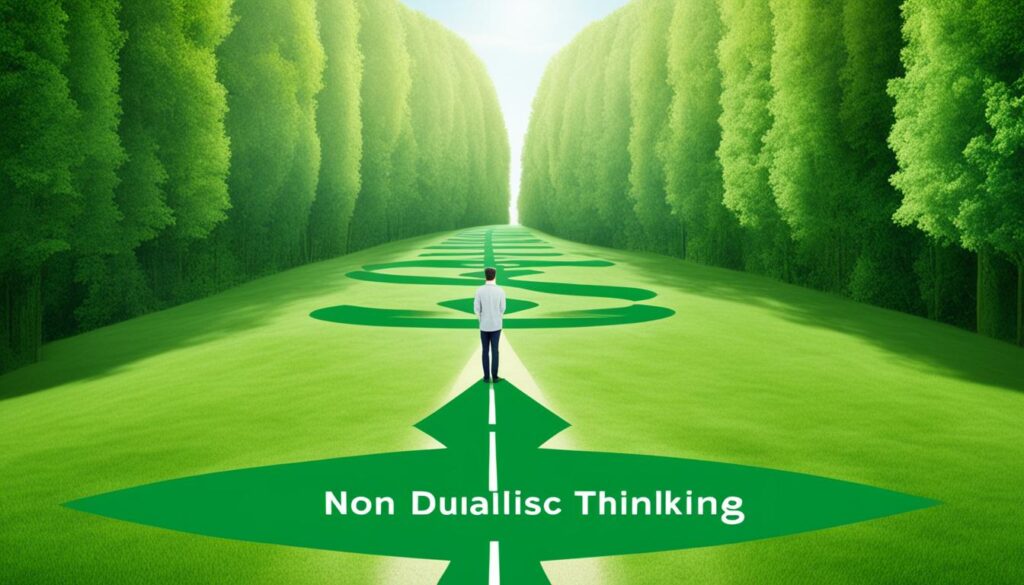“Peace comes from within. Do not seek it without.” – Buddha
Are you longing for a sense of peace, clarity, and contentment? In a world filled with distractions, stress, and conflicting ideologies, finding inner peace can seem like an elusive goal. But what if there was a powerful and transformative way to experience lasting serenity?
Buddhism offers deep insights into the nature of reality and the human mind, guiding us towards a profound shift in perspective. By embracing non dualistic thinking, we can unlock the secrets to revitalizing our mental health and unleashing unmatched confidence.
Non-dualistic thinking invites us to transcend the confines of dualistic beliefs and embrace the interconnectedness of all things. It calls us to surrender our attachments to egoic judgments, and instead cultivate a profound self-acceptance rooted in the present moment. Through non-dual awareness, we can awaken to the truth that we are not separate entities, but integral parts of an interconnected web of existence.
Key Takeaways
- Non-dualistic thinking offers a path to inner peace and contentment.
- Embracing interconnectedness and surrendering egoic judgments are key practices.
- Cultivating profound self-acceptance leads to increased mental well-being.
- Non-dual awareness allows us to connect deeply with ourselves and the world.
- By embracing non dualistic thinking, we can reclaim our inner power and find a deeper connection to life.
The Shift from Dualistic to Non-Dualistic Perspective
The shift from a dualistic to a non-dualistic perspective challenges the notion of separateness, urging you to recognize the interconnectedness that exists in the world. This transition can be both liberating and unsettling, as it disrupts your prior understanding of reality. However, embracing a non-dualistic perspective has the power to foster a profound sense of unity, dissolving feelings of separateness and leading to greater peace and connection in your life.
Overcoming dualistic thinking requires a willingness to redefine your personal identity and values. It involves letting go of ego-driven motivations and embracing a deeper understanding of your place within the interconnected web of life. By transcending binary perspectives, you can navigate the complexities of existence with more clarity and compassion.
Achieving a non-dualistic mindset involves shifting from a mindset of duality, where experiences are compartmentalized into opposites, to a mindset of non-duality, where you recognize the inherent interconnectedness and oneness of all things. This shift in perspective allows you to embrace the complexities of life without the need to label experiences as inherently “good” or “bad,” but rather as interconnected parts of a greater whole.
Fostering a Non-Dualistic Approach
- Embrace paradox: Recognize the coexistence of seemingly contradictory truths and embrace the beauty found in the balance between them.
- Cultivate awareness: Develop mindfulness practices that help you observe and release dualistic thinking patterns, allowing you to perceive the interconnectedness of all experiences.
- Practice non-judgment: Let go of ego-driven judgments and embrace a non-dualistic perspective that transcends notions of right and wrong.
- Cultivate compassion: Extend compassion not only to yourself but also to others, recognizing their interconnectedness and shared human experience.
The journey from a dualistic to a non-dualistic mindset may be challenging, but the rewards are immense. Embracing a non-dualistic perspective can lead to a deep sense of inner peace and connection to the world around you. By shifting your mindset and valuing the interconnectedness of all things, you can transform your experience of reality and nurture a more harmonious existence.
Embrace the power of a non-dualistic approach and experience the transformative effects it can have on your life.

Balancing Non-Dual Awareness in Daily Life
Integrating non-dualistic thinking into your daily life can be a transformative journey, especially in a society that often prioritizes materialism and individual achievement. The constant demands and distractions of modern life can easily pull you away from your spiritual pursuits and non-dual perspective, but it is essential to find ways to maintain a non-dual outlook amidst the chaos.
One powerful tool for cultivating non-dual awareness is mindfulness practice. By consciously bringing your attention to the present moment, you can anchor yourself in the here and now, allowing the external noise to fade away and connecting with the essence of non-dualistic thinking. Engaging in meditation, deep breathing exercises, or simply taking moments of stillness throughout your day can help you stay centered and attuned to the interconnectedness of all things.
Another key aspect is reevaluating your priorities and values. In a world that often celebrates external success and achievements, it is important to question whether these pursuits truly align with your non-dualistic approach. Take the time to reflect on what truly matters to you and what brings you genuine fulfillment and peace. Aligning your actions with your values allows you to approach life with greater authenticity and purpose, staying true to your non-dualistic mindset.
Furthermore, being mindful of how you engage in work and social activities can make a significant difference. Embracing compassion and wisdom as guiding principles can help you navigate day-to-day interactions with greater empathy and understanding. By actively seeking opportunities to contribute to the well-being of others, you demonstrate the principles of non-dualistic thinking in action.

Strategies for Balancing Non-Dual Awareness in Daily Life
1. Practice Mindfulness: Engage in meditation, deep breathing exercises, and moments of stillness to anchor yourself in the present moment and connect with the essence of non-dualistic thinking.
2. Reflect on Priorities and Values: Question whether external success aligns with your non-dualistic approach. Determine what truly brings you fulfillment and peace, and align your actions with your values.
3. Cultivate Compassion and Wisdom: Approach work and social interactions with empathy and understanding. Seek opportunities to contribute to the well-being of others, embodying non-dualistic principles.
| Benefits of Balancing Non-Dual Awareness in Daily Life | Strategies |
|---|---|
| Improved mental well-being | Mindfulness practice |
| Greater fulfillment and peace | Reevaluating priorities and values |
| Deeper connection with others | Cultivating compassion and wisdom |
| Alignment with authentic self | Mindfulness practice |
Incorporating non-dualistic thinking into your daily life requires conscious effort and commitment. By embracing mindfulness, reevaluating priorities and values, and approaching interactions with compassion and wisdom, you can cultivate a balanced non-dual awareness that transforms your experience of the world.
Nurturing Relationships in a Non-Dualistic Perspective
The shift to a non-dualistic perspective can sometimes create feelings of disconnection or alienation in relationships with others who do not share the same understanding. However, nurturing these relationships is essential for personal growth and a harmonious existence.
Finding Common Ground
When interacting with others who have a different mindset, it is crucial to find common ground. Focus on shared values, interests, or goals that can bridge the gap and create a foundation for meaningful connection. By building on these commonalities, you can foster understanding and lay the groundwork for deeper conversations.
Navigating Differences
Respecting and acknowledging differences in beliefs and values is key to nurturing relationships in a non-dualistic perspective. Embrace the idea that diversity can enrich your interactions and provide opportunities for growth. Approach disagreements and conflicts with an open mind, seeking to understand rather than convince. By actively listening and engaging in empathetic dialogue, you can bridge the gap and foster better understanding.
Openness, Understanding, and Proactive Communication
Embrace openness and understanding when engaging with others. Practice empathy by putting yourself in their shoes and considering their perspective. Avoid judgment and assumptions, instead, ask questions and seek clarity. Proactive communication means actively working on your relationships, expressing your thoughts and feelings honestly, and addressing any issues that arise in a constructive and respectful manner.
Developing and maintaining relationships in a non-dualistic perspective requires patience, compassion, and a commitment to growth. It involves embracing differences, seeking common ground, and engaging in open and proactive communication. By nurturing these relationships, you can create a harmonious and interconnected world, embodying the principles of non-dualistic thinking.

| Challenges in Nurturing Relationships in a Non-Dualistic Perspective | Strategies for Overcoming Challenges |
|---|---|
| 1. Feeling misunderstood or judged | ● Practice active listening and empathetic communication ● Seek understanding before expressing your own perspective ● Be patient and open to differing viewpoints |
| 2. Dealing with conflicts and disagreements | ● Approach conflicts with empathy and understanding ● Communicate your thoughts and concerns respectfully ● Find common ground and compromise |
| 3. Maintaining a non-judgmental attitude | ● Cultivate self-awareness and mindfulness ● Practice non-judgment by focusing on acceptance and compassion ● Let go of the need to always be right |
| 4. Balancing personal growth with maintaining relationships | ● Prioritize self-care and personal development ● Set boundaries to ensure your well-being ● Communicate your needs and aspirations openly with loved ones |
Conclusion
Embracing non-dualistic thinking allows individuals to transcend binary perspectives and experience inner peace. By recognizing interconnectedness, surrendering to the present moment, letting go of egoic judgments, cultivating self-acceptance, and finding freedom in non-dual awareness, you can thrive in your personal and societal lives.
Navigating the challenges and integrating non-dualistic thinking into daily life requires reflection, patience, and a commitment to self-growth. It is a journey of self-discovery and transformation, where you learn to see beyond the limitations of dualistic thinking and embrace a wider perspective.
Ultimately, embracing non-dualistic thinking offers a path to harmony and a deeper connection to oneself and the world. It empowers you to overcome dualistic thinking and embrace the beauty of diversity, unity, and oneness. As you embark on this journey, remember that every moment is an opportunity to cultivate a non-dualistic approach and mindset, allowing your true essence to shine and creating a positive impact on the world around you.
FAQ
What is non-dualistic thinking?
Non-dualistic thinking is a perspective that recognizes the interconnectedness and unity of all things. It challenges the notion of separateness and embraces the idea that everything is fundamentally interconnected.
How does non-dualistic thinking differ from dualistic thinking?
Dualistic thinking categorizes the world into opposites, such as good and bad, right and wrong, while non-dualistic thinking transcends these binary perspectives and embraces the idea that everything is part of a greater whole.
How can I overcome dualistic thinking and embrace a non-dualistic perspective?
Overcoming dualistic thinking requires practices such as embracing oneness and interconnectedness, surrendering to the present moment, letting go of egoic judgments, cultivating profound self-acceptance, and finding freedom in non-dual awareness.
How can I balance non-dual awareness in my daily life?
It can be challenging to maintain a non-dualistic perspective in a society that values materialism and individual achievement. Balancing non-dual awareness requires engaging in mindfulness practices, reevaluating priorities and values, and consciously participating in work and social activities with greater compassion and wisdom.
How can I navigate relationships in a non-dualistic perspective?
Maintaining meaningful connections with others in a non-dualistic perspective requires finding common ground, navigating differences in beliefs and values, and being open, understanding, and proactive in communication.

